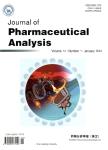A liquid chromatography with tandem mass spectrometry method for quantitating total and unbound ceritinib in patient plasma and brain tumor
A liquid chromatography with tandem mass spectrometry method for quantitating total and unbound ceritinib in patient plasma and brain tumor作者机构:Karmanos Cancer Institute Wayne State University Barrow Neurological Institute St. Joseph's Hospital& Medical Center
出 版 物:《Journal of Pharmaceutical Analysis》 (药物分析学报(英文版))
年 卷 期:2018年第8卷第1期
页 面:20-26页
核心收录:
学科分类:10[医学]
基 金:supported by the United States Public Health Service Cancer Center Support Grant P30 CA022453 Novartis for providing the study drug and isotope-labeled internal standard and providing financial support for the clinical study
主 题:Ceritinib Reversed-phase liquid chromatography with tandem mass spectrometry (LC–MS/MS) Fraction unbound in plasma Fraction unbound in brain tissue Brain tumor penetration Unbound brain-to-plasma partition coefficient
摘 要:A rapid, sensitive, and robust reversed-phase liquid chromatography with tandem mass spectrometry method was developed and validated for the determination of total and unbound ceritinib, a secondgeneration ALK inhibitor, in patient plasma and brain tumor tissue samples. Sample preparation involved simple protein precipitation with acetonitrile. Chromatographic separation was achieved on a Waters ACQUITY UPLC BEH C_(18) column using a 4-min gradient elution consisting of mobile phase A(0.1% formic acid in water) and mobile phase B(0.1% formic acid in acetonitrile), at a flow rate of 0.4 m L/min. Ceritinib and the internal standard([^(13)C_6]ceritinib) were monitored using multiple reaction monitoring mode under positive electrospray ionization. The lower limit of quantitation(LLOQ) was 1 n M of ceritinib in plasma. The calibration curve was linear over ceritinib concentration range of 1–2000 n M in plasma. The intra-and interday precision and accuracy were within the generally accepted criteria for bioanalytical method( o15%).The method was successfully applied to assess ceritinib brain tumor penetration, as assessed by the unbound drug brain concentration to unbound drug plasma concentration ratio, in patients with brain tumors.



